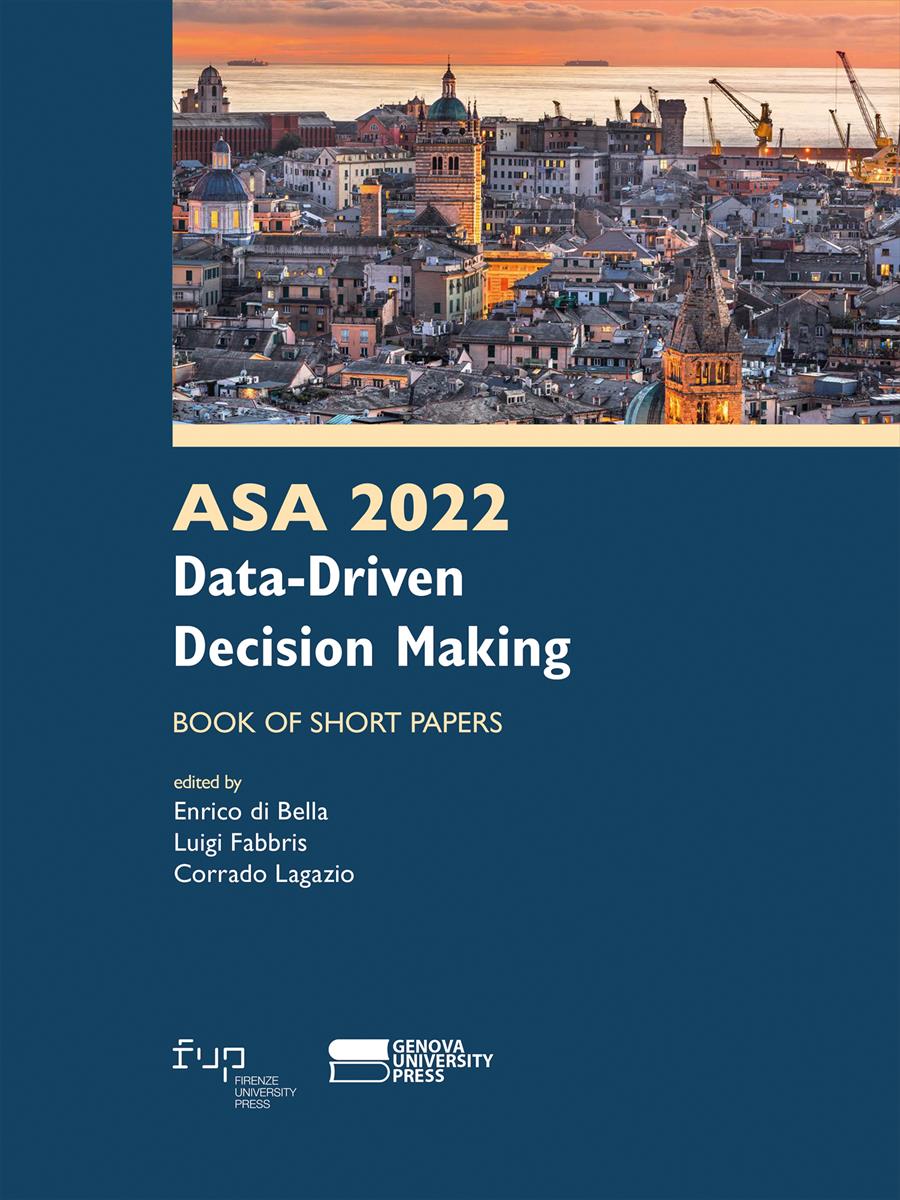- ASA 2022 Data-Driven Decision Making
- Edited by Enrico di Bella, Luigi Fabbris, Corrado Lagazio
A Natural Language Processing approach to measure expertise in the Delphi-based scenarios
- Yuri Calleo
- Simone Di Zio
- Francesco Pilla
- © 2023 Author(s) |
- CC BY 4.0
- DOI: 10.36253/979-12-215-0106-3.29
The Delphi-based scenarios (DBS) development implies the assumption of different choices, through the gathering of information and the assessment of alternative resolutions (Panpatte and Takale, 2019). During the last decades, the spread of environmental hazards has increased quickly, much to request different responses in order to develop a sustainable future for humanity planning the present (McMichael and Lindgren, 2011). Since the DBS is a creative process (Nowack et al., 2011), different figures are selected to make choices, including academics, stakeholders and citizens. However, one of the main challenges remains the measurement of expertise, in fact, during the process, the experts should be assessed based on their competences in order to avoid any conflict in the final results and, eventually, weigh their answers. In recent years, some contributions adopted the self-assessments for the experts’ evaluation (Sossa et al., 2019), but many issues still remain (such as strong subjectivity and cognitive biases which produce over or underestimation). We develop a new method to estimate the expertise by using Natural Language Processing to acquire information, extracting the contributions of experts in each topic. First, starting from a draft list of selected experts, we identify the category of reference (e.g., academia, industry, local authority, citizens etc.). We build a data repository with the personal pages (URLs) of each expert to then use Python to extract from the URLs, the number of contributions related to a keyword, different for each category (e.g., publications for academics, reports and projects for stakeholders etc.). Finally, we proceed adopting a coefficient of production with a weighted sum of the results. To practically demonstrate our approach, we applied this method to a cohort of known experts, part of the “Smart control of the climate resilience” (SCORE) H2020 European project to estimate their expertise in specific areas.
- Keywords:
- future scenarios,
- Delphi,
- expertise assessment,
University College Dublin, Italy - ORCID: 0000-0002-0190-6061
University of Chieti-Pescara G. D'Annunzio, Italy - ORCID: 0000-0002-9139-1451
University College Dublin, Ireland - ORCID: 0000-0002-1535-1239
- Barroso O. J. M., & Cabero A. J. (2013), La utilización del juicio de experto para la evaluación de TIC: el coeficiente de competencia experta. Bordón. Revista de Pedagogía, 65 (2), pp. 25-38. DOI: 10.13042/brp.2013.65202.
- Bishop P., Hines A., Collins T. (2007), The current state of scenario development: An overview of techniques, Foresight, 9(1), pp. 5–25.
- Bonaccorsi A., Apreda R., Fantoni G. (2020), Expert biases in technology foresight. Why they are a problem and how to mitigate them, Technological Forecasting & Social Change, 151, pp. 1–17.
- Dalkey N., & Helmer O. (1963), An experimental application of the Delphi method to the use of experts. Management science, 9(3), pp. 458-467. DOI: 10.1287/mnsc.9.3.458.
- Di Zio S., Bolzan M., Marozzi M. (2021), Classification of Delphi outputs through robust ranking and fuzzy clustering for Delphi-based scenarios, Technological Forecasting & Social Change, 173, pp. 1211400040. DOI: 10.1016/j.techfore.2021.121140
- Di Zio S., Rosas, J. D. C., & Lamelza, L. (2017), Real Time Spatial Delphi: Fast convergence of experts' opinions on the territory. Technological Forecasting and Social Change, 115, pp. 143-154. DOI: 10.1016/j.techfore.2016.09.029.
- Gary J. E., & Heiko A. (2015), The future of foresight professionals: Results from a global Delphi study. Futures, 71, pp. 132-145.
- Gordon T. J. (1994). The delphi method. Futures research methodology, 2(3), pp. 1-30.
- Gorn L., Kleemann J., & Fürst, C. (2018), Improving the Matrix-Assessment of Ecosystem Services Provision—The Case of Regional Land Use Planning under Climate Change in the Region of Halle, Germany. Land, 7(2), pp. 76. DOI: 10.3390/land7020076.
- Kosow H., Gaßner R. (2008), Methods of future and scenario analysis: overview, assessment, and selection criteria, Bonn, Deutsches Institut für Entwicklungspolitik.
- Mullen P. (2003), Delphi: myths and reality, Journal of Health Organisation and Management, 17 (1), pp. 37–52.
- Nair V. G. (2014), Getting started with beautiful soup. Packt Publishing Ltd.
- Nowack M., Endrikat J., & Guenther E. (2011), Review of Delphi-based scenario studies: Quality and design considerations. Technological Forecasting and Social Change, 78(9), pp. 1603-1615.
- Rodríguez P. O. S. (1995), Land use conflicts and planning strategies in urban fringes: a case study of western Caracas, Venezuela.
- Rowe G., & Wright G. (1999), The Delphi technique as a forecasting tool: issues and analysis. International journal of forecasting, 15(4), pp. 353-375. DOI: 10.1016/S0169-2070(99)00018-7.
- Saaty T.L. (1980), The Analytic Hierarchy Process. McGraw-Hill, New York.
- Sossa J. W. Z., Halal, W., & Zarta, R. H. (2019), Delphi method: analysis of rounds, stakeholder and statistical indicators. Foresight. DOI: 10.1108/FS-11-2018-0095.
- Varho V., Rikkonen P., & Rasi, S. (2016), Futures of distributed small-scale renewable energy in Finland—A Delphi study of the opportunities and obstacles up to 2025. Technological Forecasting and Social Change, 104, pp. 30-37.
Chapter Information
Chapter Title
A Natural Language Processing approach to measure expertise in the Delphi-based scenarios
Authors
Yuri Calleo, Simone Di Zio, Francesco Pilla
Language
English
DOI
10.36253/979-12-215-0106-3.29
Peer Reviewed
Publication Year
2023
Copyright Information
© 2023 Author(s)
Content License
Metadata License
Bibliographic Information
Book Title
ASA 2022 Data-Driven Decision Making
Book Subtitle
Book of short papers
Editors
Enrico di Bella, Luigi Fabbris, Corrado Lagazio
Peer Reviewed
Publication Year
2023
Copyright Information
© 2023 Author(s)
Content License
Metadata License
Publisher Name
Firenze University Press, Genova University Press
DOI
10.36253/979-12-215-0106-3
eISBN (pdf)
979-12-215-0106-3
eISBN (xml)
979-12-215-0107-0
Series Title
Proceedings e report
Series ISSN
2704-601X
Series E-ISSN
2704-5846
